|
|
|
Sort Order |
|
|
|
Items / Page
|
|
|
|
|
|
|
| Srl | Item |
| 1 |
ID:
117870
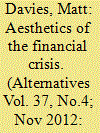

|
|
|
|
|
| Publication |
2012.
|
| Summary/Abstract |
The ways that financialization has contributed to the technocratic and antipolitical management of economies have become ever more evident in the wake of the financial crisis that commenced in the autumn of 2007. This bracketing and suspension of politics occurs in various ways but significantly, it does so through the obscuring of work as a moment of economic life. If economics has been complicit in this antipolitics, can an aesthetic approach to financialization shed light on how work is rendered invisible? This article analyzes four short film clips all distributed through YouTube to show not only how their visual and narrative elements organize subjectivities for an antipolitics of finance but also to find in the popular aesthetic a different "distribution of the sensible" that permits moments of suspension or rupture that can politicize financialized subjectivity and begin to recover a politics of work.
|
|
|
|
|
|
|
|
|
|
|
|
|
|
|
|
| 2 |
ID:
169050


|
|
|
|
|
| Summary/Abstract |
Financial literacy is defined as the knowledge, skills, and ability to navigate increasingly complex financial markets, and is considered to empower consumers to make responsible financial decisions. It has been widely promoted as a crucial life skill following the 2008 financial crisis. This study critically analyzes financial literacy education initiatives in Turkey through ethnographic research. Financial literacy curricula provide the basic knowledge of finance as well as instruct subjects ways to conduct financial planning, budgeting, debt management, creditworthiness, saving, and investment. Financial literacy agenda deepens neo-liberal governmentality by promoting an entrepreneurial subjectivity and making individuals more aware and responsible for social risks. The cultural political economy perspective of this study analyzes financialized capital accumulation dynamics together with the reshaping of culture and the constitution of financialized subjectivities.
|
|
|
|
|
|
|
|
|
|
|
|
|
|
|
|
| 3 |
ID:
188227
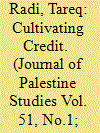

|
|
|
|
|
| Summary/Abstract |
Since 2007, the Palestinian Authority has implemented a strategy of financialized urbanization in response to economic crises precipitated by Israel’s settler-colonial stranglehold on the Palestinian economy. This article argues that financialized urbanization operates as a mechanism to expand the local banking sector and as a modality of settler-colonial alienation. Examining the joint-ownership structures of companies whose activities straddle real estate and financial markets, the article shows where land ownership in the West Bank ultimately lies. The study highlights qualitative changes in money lending and the extended reach of finance to emphasize the risks of financial collapse. Understanding finance capital and settler colonialism as systems predicated on managing risk for maximum returns, the discussion draws their relation to each other into a single analytical framework to center the question of land dispossession and racialization at the heart of financialized urbanization.
|
|
|
|
|
|
|
|
|
|
|
|
|
|
|
|
| 4 |
ID:
091627


|
|
|
|
|
| Publication |
2009.
|
| Summary/Abstract |
Political protest in Europe and the problematic politics surrounding bank recapitalization in the US have raised growing concerns about the rise of populist politics. Populist politics is problematic in its search for simplistic solutions to complex problems, its disdain for institutions and its political ambiguity. Nonetheless, the rise of populist mobilization also points to genuine concerns about the functioning of democracy. The politics of financial regulation has been dominated by a narrow, utilitarian and technocratic mode of policy-making that has tried to limit public debate, favouring an expert discourse which privileges questions of efficiency over questions of distribution. This article explores the distributional issues at stake in banking recapitalization (particularly questions about the returns governments receive for their investment) and regulation (through an exploration of the financialization literature). It argues that, while populist appeals to 'the people' are too ambiguous to be helpful, given the complexity of the interests at stake in financial regulation, there is a need for a wider and more democratic debate about financial regulation that pays greater attention to distributional issues. Populist mobilization can create pressure for debate, even if it presents few solutions. As a result, we should be wary of moves to shift too much regulation to the international level where populist mobilization is less effective.
|
|
|
|
|
|
|
|
|
|
|
|
|
|
|
|
| 5 |
ID:
140251
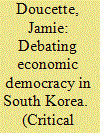

|
|
|
|
|
| Summary/Abstract |
In the 2012 Korean presidential election, both liberal and conservative parties fought their campaigns on the slogan of “economic democratization,” marking a strong departure from past presidential elections and the growth-first policies of the then-incumbent conservative administration. Both parties pledged to tackle growing social polarization and the concentration of economic power by reforming the corporate governance of Korea's large, family-led conglomerates (chaebol), to the degree that chaebol reform itself became synonymous with economic democratization. This focus led to a series of heated exchanges among liberal-left reformers about the vision of economic democratization being promoted, with one camp favoring the creation of a “fair market” through the restructuring of the chaebol and another promoting the protection of the chaebol’s management rights over their affiliates as a desirable strategy for the creation of a Korean welfare state. This essay examines the long-standing tensions between these two liberal-left perspectives and argues that the capital-centric and market-based visions these camps promoted risk confining intellectual debate over the meaning of economic democracy within boundaries that serve dominant political interests.
|
|
|
|
|
|
|
|
|
|
|
|
|
|
|
|
| 6 |
ID:
148620
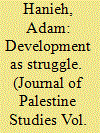

|
|
|
|
|
| Summary/Abstract |
The occupied Palestinian territories (oPt) are a major recipient of global aid flows, ostensibly aimed at improving development outcomes for the Palestinian population. This article presents a critical analysis of the ways that development is being conceived and practiced by major actors in the oPt. By analyzing different conceptions of power, the article examines how dominant approaches to development hide the ongoing reality of Israeli settler colonialism by dehistoricizing Zionism and its project; incorporating the structures of Israeli occupation into official Palestinian development strategy; and promoting an economic perspective that views development as an objective and disinterested process operating above (and outside) power relations. After considering some of the ramifications of current approaches to development, the article concludes with brief remarks on how this critique can help to reframe and articulate an alternative strategy.
|
|
|
|
|
|
|
|
|
|
|
|
|
|
|
|
| 7 |
ID:
160845


|
|
|
|
|
| Summary/Abstract |
Considering that debt has become a pervasive feature of contemporary life in Mongolia, this article calls for a nuanced examination of the diversity of current debt relations as evinced through its multiple moral interpretations and social effects. Through case studies of moneylenders in contemporary Dornod Province, I discuss (1) how local actors perceive multiple moralities and types of debt (e.g. formal and informal/kinship); (2) how moneylenders comprise an occupational role as ‘translators’ between these different registers; and thus (3) how they allow local debtor actors to navigate their debt load by moving money between the varying registers. By mobilizing local forms of social value, moneylenders create financial value that supports and enables bank debt. As a result, the moralities and logics of finance have increasingly pervaded aspects of local social relations in the collateralization of social standing and the designation of interest payment as a form of community assistance.
|
|
|
|
|
|
|
|
|
|
|
|
|
|
|
|
| 8 |
ID:
181541
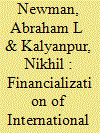

|
|
|
|
|
| Summary/Abstract |
We investigate how the international investment regime turned into an investment vehicle. Through the process called third-party funding, financiers back international legal claims by firms against countries and in turn seek a share of any potential award. More generally, we add to debates on how international regimes evolve and at times generate unanticipated consequences. Building off work on the sociology of fields, we argue that institutional change can occur when individuals from different fields interact. Each field has its own local practices and beliefs about how governance institutions like international regimes function. When professionals from one field analyze problems in another, they use the tools from their native field. If potential solutions provide material and status benefits for the dominant actors in the targeted regime, cross-field coalitions can form and change the targeted regime’s practice. As hedge funds in the finance field and lawyers in the international law field sought to reinvent themselves after the 2008 financial crisis, they teamed up to make Investor State Dispute Settlement a speculator’s game. Theoretically, we embed theories of regime change within larger social relations, highlighting the importance of informal interactions among regime operators for the use and function of governance institutions. We underscore the role of field interdependence as actors engage in contestation across social and political domains. Empirically, we demonstrate the way in which financialization has had far-reaching consequences that extend well beyond traditional economic sectors, reconfiguring the practice of international law.
|
|
|
|
|
|
|
|
|
|
|
|
|
|
|
|
| 9 |
ID:
110209
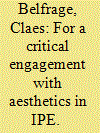

|
|
|
|
|
| Publication |
2012.
|
| Summary/Abstract |
Advanced capitalism is at a historical conjuncture in which aestheticization and financialization combine to intensify and deepen the 'cult of capitalism' at the expense of economic imagination. International Political Economy (IPE) is, however, not only poorly equipped to understand the implications of these closely linked transformations, it also avoids considering them by shunning aesthetics. To contribute to the rejuvenation of economic imagination, IPE must explicitly aim at both understanding these processes and their confluences, and engaging with them. Rescue cannot come from orthodox IPE because of its embededdness in the reified 'Kantian Desire', which promotes the neglect of recognition in aesthetics and the complexities of human agency under financialization. Critical IPE is more apt at grasping related struggles, which it has shown in for instance research on the financialization of everyday life. Nevertheless, its engagement with aesthetics remains modest and inadequate. Critical IPE concerned with financialization should see it as one of its core tasks to turn to and engage with aesthetics as a means to contribute to critical economic imagination. To this end, the article outlines a critical IPE approach to aesthetics, inspired by Frankfurt School Critical Theory.
|
|
|
|
|
|
|
|
|
|
|
|
|
|
|
|
| 10 |
ID:
160481


|
|
|
|
|
| Summary/Abstract |
How does maintaining international primacy affect a hegemon's domestic political economy? Debates on hierarchy, retrenchment, and structural power in the global economy are dominating international relations, yet scholars pay limited attention to the second-image reversed consequences of America's global role. The three books under review begin to correct this deficit. Combining their insights uncovers the effects of power politics on an area of substantial public and academic interest: economic inequality. While rising inequality is surely a multicausal outcome, research across the social sciences pinpoints technological change and the financialization of the American economy as fundamental drivers of the recent “redistribution.” These two shifts are generally treated as exogenous shocks in our models; the causal logics of the works under review illustrate that hegemony is the underlying, endogenous force. The analysis indicates a need for political scientists to study the interaction of international and domestic politics as a dynamic process, which would be bolstered by borrowing historical institutionalism's analytic toolkit. Investigating feedback loops and sequencing across both levels of analysis and across issue areas that are currently studied in isolation indicates an agenda that will better integrate security and political economy scholarship.
|
|
|
|
|
|
|
|
|
|
|
|
|
|
|
|
| 11 |
ID:
191154
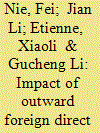

|
|
|
|
|
| Summary/Abstract |
This study examines the impact of outward foreign direct investment (OFDI) on Chinese manufacturing firms' financialization and servitization. Using a difference-in-differences approach with propensity score matching, we found that OFDI encouraged firms' financial and service activities. The effects of OFDI on financialization were stronger for firms specializing in short-term financial assets, operating in labor and technology-intensive sectors, investing overseas to pursue production, resources and markets there, and investing in non-OECD and Belt and Road Initiative (BRI) countries. Meanwhile, firms investing overseas were more likely to provide services at the sale or postsale stages. Outward foreign direct investment has also boosted the service activities of firms operating in the technology-intensive sector by investing overseas to seek resources and markets, as well as investing in non-OECD and BRI countries. Finally, OFDI partially influenced the extent of financialization and servitization of firms by affecting their profit-making ability.
|
|
|
|
|
|
|
|
|
|
|
|
|
|
|
|
| 12 |
ID:
160846
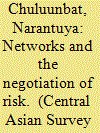

|
|
|
|
|
| Summary/Abstract |
This article identifies relationships that dominate small and medium businesses in Mongolia. Unlike other parts of Asia, these relationships are not necessarily hierarchical, nor are they purely market-driven. Rather, they are characterized by groups of people who sustain each other’s businesses and the social relations that hold them in place. In identifying such relations, we extend questions raised in the ‘economy of favours’ literature. If favours granted between known individuals are not simply about economic transactions, we ask, then what does this say about the kind of capitalist economy prevalent in Mongolia? Not simply an outcome of external forms of financialization, nor a remnant of the socialist planned economy, these relations open up the possibility for a range of ways of doing business in a climate that does not guarantee economic and social security in the sense that we may be familiar with. Attending to the way business deals and people are made and remade within networks and groups, capitalism is opened up to an economic diversity that shapes it from within.
|
|
|
|
|
|
|
|
|
|
|
|
|
|
|
|
| 13 |
ID:
088921
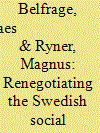

|
|
|
|
|
| Publication |
2009.
|
| Summary/Abstract |
Steering a middle course between the strong neoliberalization thesis and arguments that deny that neoliberalization has occurred, this article accounts for the complex and hybridic shift in Sweden from pension reform through share ownership as a socialist strategy to an as-of-yet incomplete and contradictory neoliberal process. Noting the broader significance of Sweden for the international debate over pension reform, the article unpacks the concept of "mass investment culture" to discern the significant headway toward neoliberalization in Swedish pension savings and provision while still noting profound sources of crisis tendencies.
|
|
|
|
|
|
|
|
|
|
|
|
|
|
|
|
|
|
|
|
|